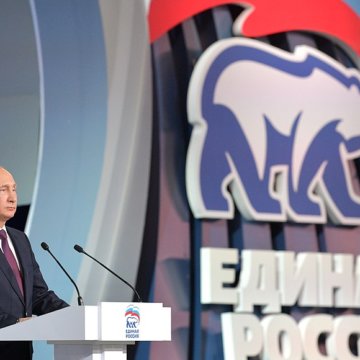- About
- Topics
- Picks
- Audio
- Story
- In-Depth
- Opinion
- News
- Donate
- Signup for our newsletterOur Editors' Best Picks.Send
Read, Debate: Engage.
| topic: | Good Governance |
|---|---|
| located: | Russia |
| editor: | Igor Serebryany |
The United Russia party, which has been serving as the Kremlin's backbone since 2001, may disappear from the country's political arena, unidentified sources in the Presidential Administration told Latvian news service Meduza on Wednesday, February 26.
The sources said the party would undertake major makeover to keep its administrative and financial resources while dramatically changing its image on the runup of the next parliamentary elections. The elections have been scheduled for September 2021.
To render itself a "new" party, the the United Russia (UR) has been eyeing its merge with the so-called All-Russia Popular Front (ONF). It also plans to get rid of one-man leadership.
The party's formal leader Dmitry Medvedev has served as Russia's Prime Minister, but his role as the party's leader has never been bright enough. Russian mass media has rarely mentioned him in connection with the UR activities. When he unexpectedly stepped down in January, his political future has become unclear. That makes his work as the UR frontman even less productive.
According to Meduza, the idea to marry the UR and ONF came from the head of the Popular Front Mikhail Kuznetsov.
The news came out of the blue as on one in the ONF was able to explain the developments. Mr Kuznetsov was unavailable for comments but two of his deputies told FairPlanet that they "are surprised with the news". One of them said on the condition of anonymity that "Kuznetsov could initiate the merge because he lacks the experience required for such transformation".
The ONF press service declined to comment "until the situation clears up".
The first deputy chairman of the United Russia, Andrei Isayev, told FairPlanet that he did not possess any confirmation of the possible makeover of the party. Later on Wednesday, another deputy head of the UR, Sergei Perminov, also declined the prospect of the party's merger with the ONF.
Still, rebranding is not just possible but desirable for the UR, the dean of the Politics department in the St-Petersburg University Stanislav Yeremeev believes. "In countries with stable political systems, the parties can afford to keep their image and names intact for centuries, take England or the US. In the countries in transition, like Russia, public politics has always been a sort of a show", he says.
In Russia, where social and political reforms have not stopped for 30 years, its citizens have developed a phenomenon called "mosaic thinking". A Russian voter gets tied quickly from the same names in politics and feels a constant thirst for the new ones.
"It's natural for the political parties to tune themselves under any changes of the voters' preferences. Thus all those political marriages and divorces. Any option will do providing it increases a party's representation in the parliament", Yeremeev says.
Still, the merge of the "heavyweight" structure like the UR, with a hulky bear in its logo, with semi-amateur ONF might be a fragile marriage of convenience. "the United Russia's marriage with the ONF does not enhance but dilutes the image of the ruling party. Its image has not always been positive but it's been recognizable - the crucial requirement for a successful brand", the expert stresses.
Even if the UR decides to undergo the makeover, time is running out for such a facelift. Russian law demands the new party to be registered at least one year ahead of elections day. That means that the UR transition must be finalized by September at the very latest.
Rebranding of the UR is not humiliating, a professor in the Russian Peoples Friendship University Yuri Pochta suggests. "The UR, unlike the Liberal Democratic Party, has never been a 'one-man party'. But it doesn't mean the United Russia would suffer from a charismatic leader. Dmitry Medvedev's ousting as Prime Minister is a good time for changes in the party which have matured long ago", he says.
One of the problems that "have been matured long ago" is a nearly complete rejection of the "bearish" UR by the younger voters. "The UR has been losing its grip as the Russian electorate becomes younger. In 2021, the party can't rely solely on the Kremlin's backup in the election rigging as before. Lately, Putin made it clear that the UR should not expect his unconditional support unless the party stops harbouring otherwise mediocre state officials", Pochta says.
This is not the first time in Russia's modern history that the ruling party undertakes a makeover without changing anything in essence. The UR is a successor of the Our Home Is Russia party led by then-PM Victor Chernomyrdin.
